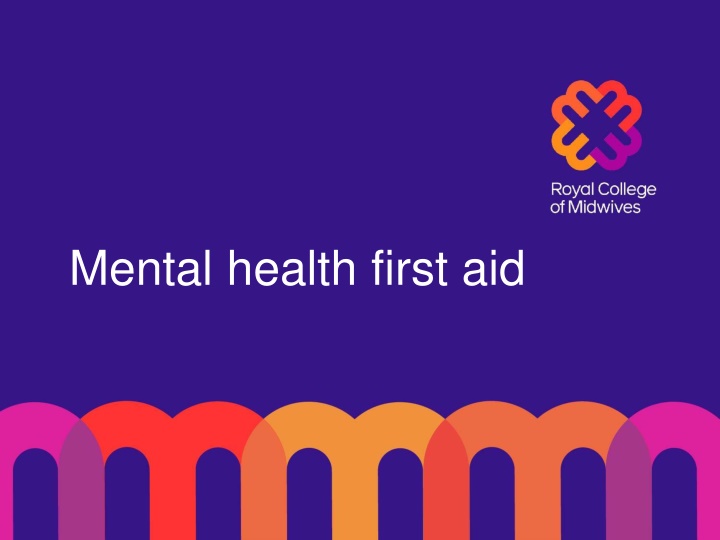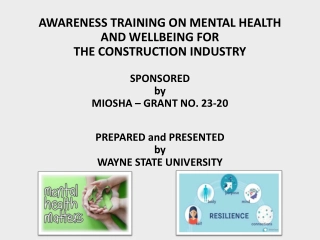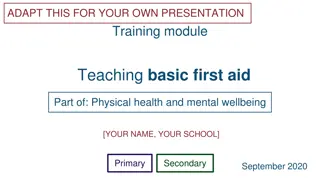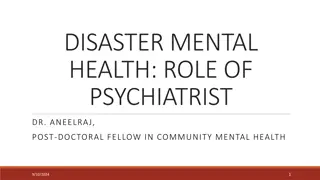
Mental Health First Aid in the Workplace
Discover the importance of mental health first aid training, the role of a mental health first aider, essential skills required, and the impact of mental health issues on individuals. Learn how to recognize signs of mental health concerns and provide support in the workplace.
Download Presentation

Please find below an Image/Link to download the presentation.
The content on the website is provided AS IS for your information and personal use only. It may not be sold, licensed, or shared on other websites without obtaining consent from the author. If you encounter any issues during the download, it is possible that the publisher has removed the file from their server.
You are allowed to download the files provided on this website for personal or commercial use, subject to the condition that they are used lawfully. All files are the property of their respective owners.
The content on the website is provided AS IS for your information and personal use only. It may not be sold, licensed, or shared on other websites without obtaining consent from the author.
E N D
Presentation Transcript
Aims of the workshop Discuss signs that yourself or staff members may need further support or assistance. Highlight the mental health first aid training and discuss having one in the trust/health board Give staff resources and information and signs to look out for a colleague who is under stress. Provide tools to help staff access mental health support. If you feel you need urgent support then you must seek appropriate medical care i.e. GP, Occupational health.
What is a mental health first aider? A Mental Health First Aider is: Professionally trained to recognise the symptoms of ill mental health The go to person in the workplace who can: Offer help Has an awareness of local services Assist you with making your life at work more manageable They also work to: Increase awareness of Mental Health Issues Reduce workplace stigma But important to remember that they are not trained therapists
Skills of a mental health first aider Anyone can become a Mental Health First Aider Skills required are: Approachability Good listener Awareness Empathy Confidence Knowledge Non-judgemental Assessment and escalation skills Confidentiality
Why is mental health important? Mental health issues are just as much as a priority as physical health, if not more so as our mental health directly affects our physical wellbeing Mental ill-health affects as many as 1 in 4 people 1 in 4 of us will experience mental health issues at some point in our lives Up to 300,000 people with mental health issues are made redundant from their jobs each year In the UK in 2018, 15.4 million work days were lost due to work-related stress, depression or anxiety. (3B Training, 2020) The Samaritans report that since the outbreak of Covid-19 they have seen an increase in the number of calls overall and state that now 1/3 of all calls relate to Covid-19, mental health and suicidal thoughts (The Samaritans, 2020)
Group work: how can you make a difference? Changes in libido Irritability Sweating Insomnia Rapid heart rate Frequent sickness Rapid mood swings Confusion Excessive worrying Isolation Fatigue Headaches Excessive anxiousness Decreased energy Appetite changes
Group work: signs that your colleagues are under stress Learn the signs/symptoms Be supportive Talking Be attentive Know who your workplace mental health first aider is Be positive about mental health Use your annual leave Look after yourself Experiment with different ways to de-stress Repetitive enquiries Don t be afraid to bring it up Listen
Leadership and mental health first aid Leadership must be visible, be available and be supportive Where you can, guide staff to the resources they need, however basic (e.g. to rest, to speak with family, etc.) Give colleagues permission to step back and ensure staff are getting/taking their mandated breaks You do not need to have all the solutions all the time You will need to tolerate and manage uncertainty for yourself and your colleagues Your wellbeing is important too, be compassionate towards yourself You are best-placed to create a protective environment for your peers
Leadership and mental health first aid Communicate regularly and frequently to all staff, in simple clear ways Actively encourage expression of concerns and fears. Listen with patience and compassion Experiencing symptoms of stress doesn t mean you aren t up to the job; it means you re human Normalise psychological responses Remember this situation is unprecedented; it is okay to not be okay (British Psychological Society, 2020)
Group work: Covid-19 and mental health PTSD Grief Anxiety Family pressures Sickness Isolation Workplace Stress Depression Staff burnout
Covid-19 and mental health It is important, when this is over, that we do not return to business as usual without considering our long-term psychological needs (of ourselves and our workforce) Must allow time for taking stock Utilise resources at your disposal, facilitate reflection and processing of experiences Organise active learning events that involve healthcare staff at all levels feed learning into future preparedness plans Organise thanks and rewards for everyday going above and beyond Assess the needs of staff :what did they find helpful, what ongoing input would they want now. If needed, increase your access to in-house Employee Wellbeing Services Provide spaces for ongoing peer support Remember that people will process their experiences and feelings differently and at different times (British Psychological Society, 2020)
Self care Resources to support you Headspace https://www.headspace.com/nhs Unmind nhs.unmind.com/signup Sleepio http://sleepio.com/nhs-staff Daylight http://trydaylight.com/nhs-staff
Resources British Psychological Society: https://www.bps.org.uk/sites/www.bps.org.uk/files/News/News%20- %20Files/Psychological%20needs%20of%20healthcare%20staff.pdf British Psychological Society (Webinar on supporting people recovering from Covid-19):https://www.bps.org.uk/coronavirus-resources/professional Scotland: https://learn.nes.nhs.scot/28063/coronavirus-covid- 19/psychosocial-mental-health-and-wellbeing-support-for-staff Wales: https://leadershipportal.heiw.wales/playlists/view/c0abd55e-92ee- 44d2-bcd1- 33dd0221d1e3/en/1?options=oHXU%252BPmvHPR07%252FdPJVyiI5sWo5 wWqGQ3R4ZWrZU%252B9vn1fRQkuIHkJS3aCF%252F5pPA4NRIUrRdtEh tlc1jVmauiYg%253D%253D Northern Ireland: https://www.publichealth.hscni.net/covid-19- coronavirus/guidance-hsc-staff-healthcare-workers-and-care-providers/staff- health-and
Resources The Royal College of Psychiatrists: https://www.rcpsych.ac.uk/about- us/responding-to-covid-19/covid-19-and-mental-health NHS Employers toolkit: https://www.nhsemployers.org/retention-and-staff- experience/health-and-wellbeing/taking-a-targeted-approach/taking-a- targeted-approach/how-are-you-feeling-today-nhs-toolkit The Royal Society of Medicine webinar series: https://www.youtube.com/watch?v=a2EDraTRJjE&list=PL1yY3WBVbNWAU NRjD5SUeC9R-G9vT8Gvq&index=4&t=0s
References 3B Training. 2020 online: https://www.3btraining.com/first-aid- courses/mental-health-first-aider/ [Last accessed 22 June 2020]. British Psychological Society 2020 online: https://www.bps.org.uk/sites/www.bps.org.uk/files/News/News%20- %20Files/Psychological%20needs%20of%20healthcare%20staff.pdf [Last accessed 22 June 2020]. Mental Health Network. 2020. online: https://www.mentalhealthatwork.org.uk/resource/being-a-mental-health-first- aider-your-guide-to-the-role/ [Last accessed 22 June 2020]. Samaritans. 2020 online: https://www.samaritans.org/scotland/how-we-can- help/if-youre-having-difficult-time/if-youre-worried-about-your-mental-health- during-coronavirus-outbreak/ [Last accessed 22 June 2020]. A






















